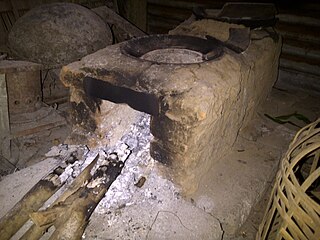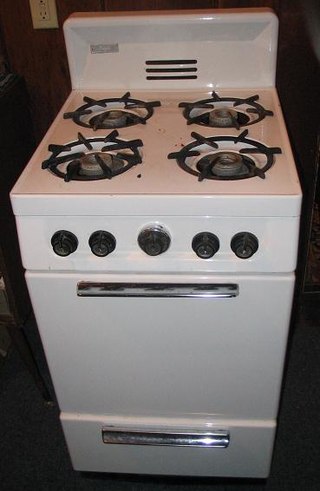Related Research Articles

Pollution is the introduction of contaminants into the natural environment that cause adverse change. Pollution can take the form of any substance or energy. Pollutants, the components of pollution, can be either foreign substances/energies or naturally occurring contaminants.

A fossil fuel is a carbon compound- or hydrocarbon-containing material such as coal, oil, and natural gas, formed naturally in the Earth's crust from the remains of prehistoric organisms, a process that occurs within geological formations. Reservoirs of such compound mixtures can be extracted and burned as a fuel for human consumption to provide heat for direct use, to power heat engines that can propel vehicles, or to generate electricity via steam turbine generators. Some fossil fuels are further refined into derivatives such as kerosene, gasoline and diesel.

The Environmental Protection Agency (EPA) is an independent agency of the United States government tasked with environmental protection matters. President Richard Nixon proposed the establishment of EPA on July 9, 1970; it began operation on December 2, 1970, after Nixon signed an executive order. The order establishing the EPA was ratified by committee hearings in the House and Senate.

Domestic technology is the incorporation of applied science into the home. There are multiple aspects of domestic technology. On one level, there are home appliances, home automation and other devices commonly used in the home, such as clothes dryers and washing machines.

A barbecue grill or barbeque grill is a device that cooks food by applying heat from below. There are several varieties of grills, with most falling into one of three categories: gas-fueled, charcoal, or electric. There is debate over which method yields superior results.

American Chemistry Council (ACC), known as the Manufacturing Chemists' Association at its founding in 1872 then as the Chemical Manufacturers' Association, is an industry trade association for American chemical companies, based in Washington, D.C.

The Maytag Corporation is an American home and commercial appliance company. The company has been owned by Whirlpool Corporation since April 2006.

A stove or range is a device that generates heat inside or on top of the device, for local heating or cooking. Stoves can be powered with many fuels, such as electricity, natural gas, gasoline, wood, and coal.
Frigidaire Appliance Company is the American consumer and commercial home appliances brand subsidiary of multinational company Electrolux, a Swedish multinational home appliance manufacturer, headquartered in Stockholm.

A gas stove is a stove that is fuelled by combustible gas such as natural gas, propane, butane, liquefied petroleum gas, syngas, or other flammable gas. Before the advent of gas, cooking stoves relied on solid fuels such as coal or wood. The first gas stoves were developed in the 1820s and a gas stove factory was established in England in 1836. This new cooking technology had the advantage of being easily adjustable and could be turned off when not in use. The gas stove, however, did not become a commercial success until the 1880s, by which time supplies of piped gas were available in cities and large towns in Britain. The stoves became widespread on the European Continent and in the United States in the early 20th century.
Sunbeam Products is an American company founded in 1897 that has produced electric home appliances under the Sunbeam name since 1910. Its products have included the Mixmaster mixer, the Sunbeam CG waffle iron, Coffeemaster (1938–1964) and the fully automatic T20 toaster.
Hisense Group is a Chinese multinational major appliance and electronics manufacturer headquartered in Qingdao, Shandong Province, China. Televisions are the main products of Hisense, and it is the largest TV manufacturer in China by market share since 2004. Hisense is also an OEM, so some of its products are sold to other companies and carry brand names not related to Hisense.

The Clean Air Act (CAA) is the United States' primary federal air quality law, intended to reduce and control air pollution nationwide. Initially enacted in 1963 and amended many times since, it is one of the United States' first and most influential modern environmental laws.
The American Council for an Energy-Efficient Economy (ACEEE) is a nonprofit, 501(c)(3) organization. Founded in 1980, ACEEE's mission is to act as a catalyst to advance energy efficiency policies, programs, technologies, investments, and behaviors in order to help achieve greater economic prosperity, and environmental protection.

The environmental impact of paper are significant, which has led to changes in industry and behaviour at both business and personal levels. With the use of modern technology such as the printing press and the highly mechanized harvesting of wood, disposable paper became a relatively cheap commodity, which led to a high level of consumption and waste. The rise in global environmental issues such as air and water pollution, climate change, overflowing landfills and clearcutting have all lead to increased government regulations. There is now a trend towards sustainability in the pulp and paper industry as it moves to reduce clear cutting, water use, greenhouse gas emissions, fossil fuel consumption and clean up its influence on local water supplies and air pollution.
The Automobile Manufacturers Association was a trade group of automobile manufacturers that operated under various names in the United States from 1911 to 1999. It was replaced by the Alliance of Automobile Manufacturers.

Goodman Manufacturing is an American company operating as an independent subsidiary of Daikin Group, the world's largest manufacturer of heating, ventilation and air conditioning products and systems. The company, founded in 1975 and based in Waller, Texas, manufactures residential heating and cooling systems.

Environment America is a federation of state-based environmental advocacy organizations in the United States. The organization researches and advocates for environmental policies through lobbying, litigation, and the mobilization of public support. Environment America advocates new laws and policies to address climate change, air pollution and water pollution, and is a proponent of clean energy, while opposing offshore drilling.
CADAC, a South African company headquartered in Johannesburg, is a marketer of a wide range of outdoor leisure and patio products designed for durability, portability and convenience.
Dacor ( "day-core") is a subsidiary of Samsung Electronics America that designs, manufactures and distributes kitchen appliances, specializing in the high-premium product tier, including wall ovens, ranges, cooktops, dishwashers, warming drawers, microwaves, ventilation hoods, refrigerators and wine dispensers. Founded in 1965 by Stanley M. Joseph, the company had been continuously owned and operated by three generations of the Joseph family until it was sold to Samsung in August 2016.
References
- ↑ “Association Calendar,” : Air Conditioning, Heating & Refrigeration News, January 3, 2005 (library card access required)
- ↑ “BBQ lobby has stake in cleaner air,” Politico, July 2, 2007
- ↑ “Wood Heat Rises Again,” Christian Science Monitor, October 21, 2008
- ↑ “Outdoor Home Heater Makers Agree to Pollution Cutbacks,” New York Times, February 1, 2007
- ↑ “Finding Savings Around the Fire,” New York Times, December 11, 2005